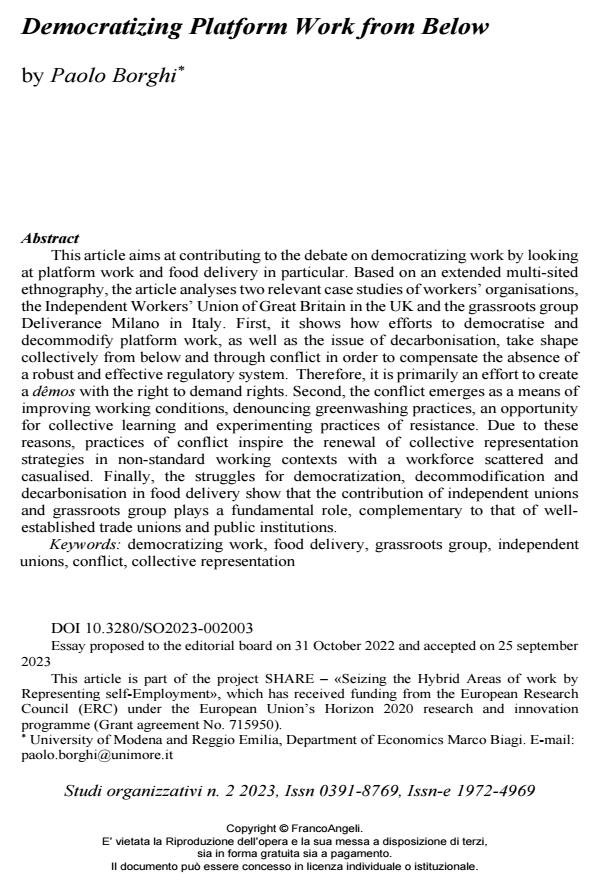Democratizing Platform Work from Below
Titolo Rivista STUDI ORGANIZZATIVI
Autori/Curatori Paolo Borghi
Anno di pubblicazione 2024 Fascicolo 2023/2
Lingua Inglese Numero pagine 28 P. 51-78 Dimensione file 247 KB
DOI 10.3280/SO2023-002003
Il DOI è il codice a barre della proprietà intellettuale: per saperne di più
clicca qui
Qui sotto puoi vedere in anteprima la prima pagina di questo articolo.
Se questo articolo ti interessa, lo puoi acquistare (e scaricare in formato pdf) seguendo le facili indicazioni per acquistare il download credit. Acquista Download Credits per scaricare questo Articolo in formato PDF

FrancoAngeli è membro della Publishers International Linking Association, Inc (PILA), associazione indipendente e non profit per facilitare (attraverso i servizi tecnologici implementati da CrossRef.org) l’accesso degli studiosi ai contenuti digitali nelle pubblicazioni professionali e scientifiche.
This article aims at contributing to the debate on democratizing work by looking at platform work and food delivery in particular. Based on an extended multi-sited ethnography, the article analyses two relevant case studies of workers’ organisations, the Independent Workers’ Union of Great Britain in the UK and the grassroots group Deliverance Milano in Italy. First, it shows how efforts to democratise and decommodify platform work, as well as the issue of decarbonisation, take shape collectively from below and through conflict in order to compensate the absence of a robust and effective regulatory system. Therefore, it is primarily an effort to create a dêmos with the right to demand rights. Second, the conflict emerges as a means of improving working conditions, denouncing greenwashing practices, an opportunity for collective learning and experimenting practices of resistance. Due to these reasons, practices of conflict inspire the renewal of collective representation strategies in non-standard working contexts with a workforce scattered and casualised. Finally, the struggles for democratization, decommodification and decarbonisation in food delivery show that the contribution of independent unions and grassroots group plays a fundamental role, complementary to that of well-established trade unions and public institutions.
Questo articolo intende contribuire al dibattito sulla democratizzazione del lavoro ragionando sul lavoro di piattaforma e, in particolare, sul contesto del food delivery. L’analisi qui proposta, che si basa su un’attività etnografica realizzata fra il 2019 e il 2021 in Italia e nel Regno Unito, prende in considerazione le attività di due organizzazioni di lavoratori, Independent Workers’ Union of Great Britain e il gruppo autorganizzato Deliverance Milano. Nel fare ciò, in primo luogo, l’articolo mostra come gli sforzi per democratizzare e demercificare il lavoro di piattaforma, così come la questione della decarbonizzazione, prendano forma collettivamente dal basso attraverso il conflitto, come strategia per compensare l’assenza di un sistema di regolamentazione solido ed efficace. Pertanto, si tratta innanzitutto di uno sforzo per creare un dêmos con il diritto di chiedere diritti. In secondo luogo, l’analisi evidenzia come il conflitto emerga, nelle sue molteplici sfaccettature, come un mezzo per migliorare le condizioni di lavoro, per denunciare le pratiche di greenwashing, come opportunità di apprendimento collettivo e per sperimentare pratiche di resistenza. Per queste ragioni, le pratiche di conflitto sperimentate del food delivery sono da stimolo per il rinnovamento delle strategie di rappresentanza collettiva anche in altri contesti lavorativi non standard, caratterizzati da una forza lavoro dispersa e casualizzata. Infine, le lotte per la democratizzazione, la demercificazione e la decarbonizzazione nel contesto del food delivery dimostrano come il contributo dei sindacati indipendenti e dei gruppi di base svolga un ruolo fondamentale e complementare a quello dei sindacati tradizionali e delle istituzioni pubbliche.
Parole chiave:democratizzazione del lavoro, food delivery, gruppi autorganizzati, sindacati indipendenti, conflitto, rappresentanza collettiva
- Life is (Not) a Game: Racial Platform Capitalism, Exploitation Practices and Forms of Rider Mobilization in Milan Luigi Di Cataldo, Federica Cabras, in Cambio. Rivista sulle Trasformazioni Sociali /2025
DOI: 10.36253/cambio-18529
Paolo Borghi, Democratizing Platform Work from Below in "STUDI ORGANIZZATIVI " 2/2023, pp 51-78, DOI: 10.3280/SO2023-002003